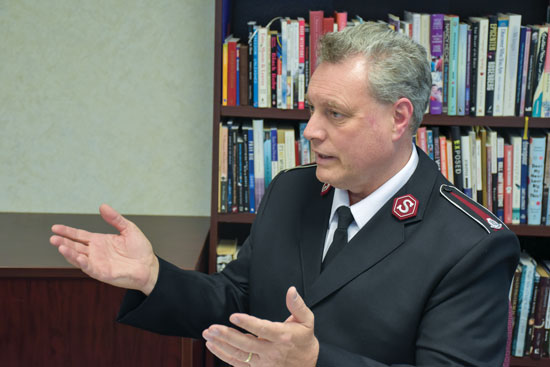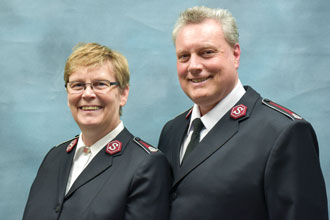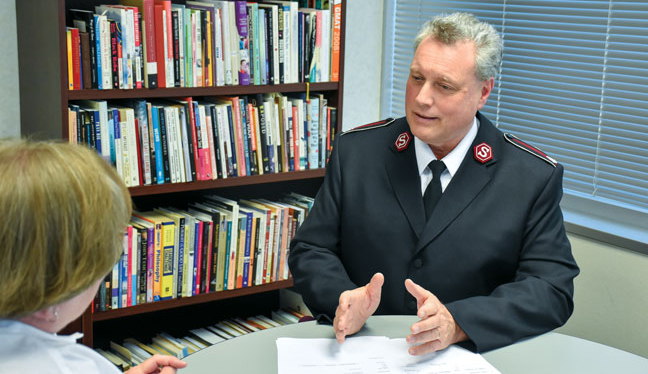What aspects of ministry are you most passionate about?
I am passionate about what happens on the front lines of ministry, be it in corps, community and family services, social services or the wider community. I am passionate about my quiet reflective time with God, and the pulpit remains very important to me. I love to preach the Word of God and have never lost my deep sense of responsibility in helping people become who God intends them to be in Christ. I am protective of the time I spend with my family—children and grandchildren—but especially with my wife, Deb. I consider this to be a ministry, too, and I believe that work-life balance is important for everybody.
Describe your leadership style.
It's a shared visionary approach—collaborative, inclusive and consultative. I'm a thoughtful listener who likes to consider the facts before I speak or react. I seek to understand my own limitations and weaknesses, and to be open to other points of view. At the same time, I'm not satisfied with unnecessary delays and, when needed, I can make hard decisions. Ultimately, I want to do what is best so that the whole Army can succeed.
What has prepared you for this role?
I've had a rewarding journey in my officership, serving 16 years as a corps officer and the remainder of my years of service in headquarters appointments as divisional youth secretary, divisional secretary for program, area commander, divisional commander and, most recently, as territorial secretary for business administration. That last role challenged me and deepened my understanding of Army governance, territorial management, policy development and resource allocation. I've also tried to develop through education, undertaking master's studies in community economic development, and I've been coached and mentored by fine leaders, both inside and outside of the Army.
What motivates you in your daily work?
I love being part of a multi-faceted movement that God has raised up as an influential part of the Christian church. I'm inspired to live out my Christian faith with conviction and allegiance to the Army's doctrines, values and practices. I'm called to do and give my best. I get energy when I see tangible outcomes that show we're making a difference. A team environment is critical—not that we always agree, but that we bring out the best in each other and together find solutions to complex matters.
 "We cannot allow aversion to risk to paralyze our ability to move the mission forward," says Colonel Lee Graves
"We cannot allow aversion to risk to paralyze our ability to move the mission forward," says Colonel Lee Graves
Is there a passage of Scripture that speaks to you?
Two verses come to mind, the first being 1 Corinthians 1:18: “For the message of the cross is foolishness to those who are perishing, but to us who are being saved it is the power of God.” The second is Colossians 2:14: “He cancelled the record of the charges against us and took it away by nailing it to the cross” (NLT). Together these verses remind me that in a changing world, the Word of God is ever unchanging. The Salvation Army says to the world that Jesus, the Saviour, is our hope. Whether you're an adherent, senior soldier, corps officer, executive director, junior soldier or chief secretary, the message is that people need the Lord. The cross and what it represents are central to our faith.
What are the Army's strengths?
Dedicated, gifted, skilled and talented people. The Lord continues to move and work in the Army. People are coming to faith and expressing an interest in corps membership. We are developing strong local leaders, volunteers, employees and officers. Creativity and entrepreneurial thought are increasing our influence. We are learning that integrated mission is a way of life, not a program. We are blessed with resources, responsible stewardship and a strong accountability framework. We have much to be grateful for!
What are the biggest challenges?
We must become whatever it is the Lord needs us to be in this present day. We must be proactive, bold and determined. We cannot allow aversion to risk to paralyze our ability to move the mission forward. We need an officer pool that's ready and available any time, anywhere, and employees that are skilled, qualified and aligned with our values. We must encourage our people to keep a balance between their personal needs and those of the Army so that they stay spiritually healthy.
 Colonels Lee and Deborah Graves take up their new appointments this month as chief secretary and territorial secretary for women's ministries, respectively
Colonels Lee and Deborah Graves take up their new appointments this month as chief secretary and territorial secretary for women's ministries, respectively
What are your thoughts on the future of our territory?
Our territorial commander, Commissioner Susan McMillan, has been leading us in the development of our territory's seven strategic priorities: spiritual health, leadership development, social justice, integrated mission, children and youth, the gospel and transformation, and discipleship. With champions and measurable outcomes identified for each, the priorities create a roadmap that will lead us to be a stronger, God-glorifying Army that continues to transform our communities. I encourage everyone to get involved, to own the priorities, to live them out. Take them into every ministry unit, embrace them in your personal lives, examine them carefully and emphasize them in your local contexts. When we do that, we will move forward together.
The territory has just launched the Calling the Courageous soldiership campaign. What impact will this have?
A growing Army! As we strengthen our membership, there will be a direct impact on mission outcome. Local leadership will increase, as will the number of officers. The corps ministries department has rolled out an inspiring campaign that calls us to model soldiership and intentionally draw in new recruits.
General André Cox is emphasizing accountability and transparency. How are we responding?
The Canada and Bermuda Territory has already engaged many of the principles of the General's call, and yet there is still opportunity for growth. The Army is accredited by Imagine Canada, a national charitable organization that recognizes our high standards of governance, financial transparency and organizational behaviour. As a territory, we are also promoting Journey of Renewal, the Army's international accountability movement, which focuses on the themes of people, passion, spirit, purpose, plan, progress, procedures and systems.
What one thing do you want Salvationists to know as you take on your new role?
I will give my surrendered all, my very best, as a good and faithful soldier. I want to be held accountable, not just by senior leadership of The Salvation Army, but by the junior soldier as well as the active and retired officer, the volunteer as well as the employee. I am excited about all that God has in store for our territory, as together we work for his honour and glory.










I want to say to Congratulations to Colonels Graves for your new role a Chief Secretary for Canada & Bermuda Terriory. We were meet in North Sulawesi ( Indonesia) few years ago.
God bless and equip you in your ministry.
Made.